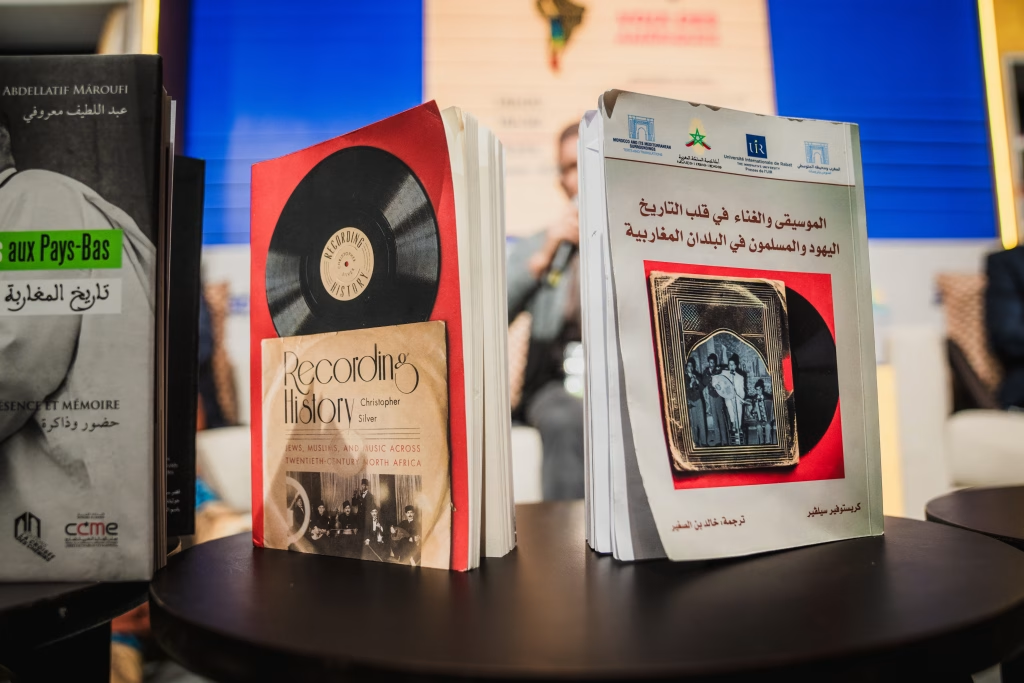A series of seminars titled “Al-Riwaq Al-Mushtarak”, organised by the Council of the Moroccan Community Abroad and the Ministry of Youth, Culture, and Communication, took place on Friday, April 18, 2025, as part of the 30th International Book and Publishing Fair in Rabat. The opening event was a roundtable discussion on the book “Music and Singing at the Heart of History: Jews and Muslims in the Maghreb Countries” by historian Christopher Silver.
In his introductory remarks, Khaled Bensaghir, academic and translator of the book into Arabic , contextualized the author’s work within the framework of coexistence in Morocco among various ethnic groups, particularly Jews and Muslims, and their shared daily lives. The researcher noted that the book goes beyond relying solely on written sources, incorporating auditory materials (such as programs and songs) collected by Christopher Silver from various parts of the world.

Ahmed Aidoun, Music researcher for his part, highlighted the book’s significance and the topics it raises. He emphasized that the relationship between Jews and Muslims in Morocco is rooted in their shared heritage, with Morocco as the primary cradle of Andalusian heritage. This heritage was transmitted through oral traditions and narratives, necessitating documentation. Aidoun reviewed several examples of collaborative musical endeavors between Jewish and Muslim musicians in Morocco and the broader Maghreb region, stressing that the cooperation between Jews and Muslims in Morocco persisted across all musical styles. He underscored that preserving this richness and exchange is what strengthens the collective legacy.
Researcher and journalist Abdelatif El Maaroufi offered an initial reading of the book, describing it as a unique work that uses songs as historical auditory documents to understand history. “The book stands out for its reliance on music and singing in Morocco and the Maghreb countries, treating them as historical documents through which the history of the relationship between the East and the West is written,” he said. For El Maaroufi, songs are a source for understanding history. Adding, the use of auditory documents is necessary for comprehending Moroccan history. He then, said, that the book paves the way for researchers to further develop this work and advocate for a national audio archive.
For his part the actor Ibrahim Mezand highlighted the author’s focus on the evolution of the music industry and its recordings in the Maghreb and France. He noted that Christopher Silver illustrates how music became a means of expressing memory, coexistence, and resistance in colonial contexts. “The book highlights figures who influenced this music industry across various Maghreb countries, contributing to its widespread dissemination,” Mr. Mezand said. He then called for the digitization of this repertoire. He also addressed the role of popular music, particularly that performed by women, in challenging prevailing social norms of the time.
The roundtable was attended by the book’s author, historian Christopher Silver, a researcher in the Jewish Studies Department at McGill University in Canada. Silver commended the presentation of his book in Morocco, noting that it is primarily intended for the Moroccan public to introduce them to a part of their history. He emphasized that “there is no history without music,”. Mr. Silver explained that his book tries to present a historical narrative from the Maghreb region, as music, in his view, transcends political boundaries.
The seminar concluded with remarks by Driss El Yazami, President of the Council of the Moroccan Community Abroad (CCME), who addressed the challenge of approaching this historical material scientifically, calmly, and objectively amidst the broader political climate. Mr. El Yazami highlighted the significant contributions and clear influence of Moroccans abroad in various fields, including music, literature, and visual arts. He called for deeper engagement in all domains and a comprehensive reflection on the contributions of the Moroccan diaspora to Moroccan modernity, beyond merely economic aspects.
ccme











